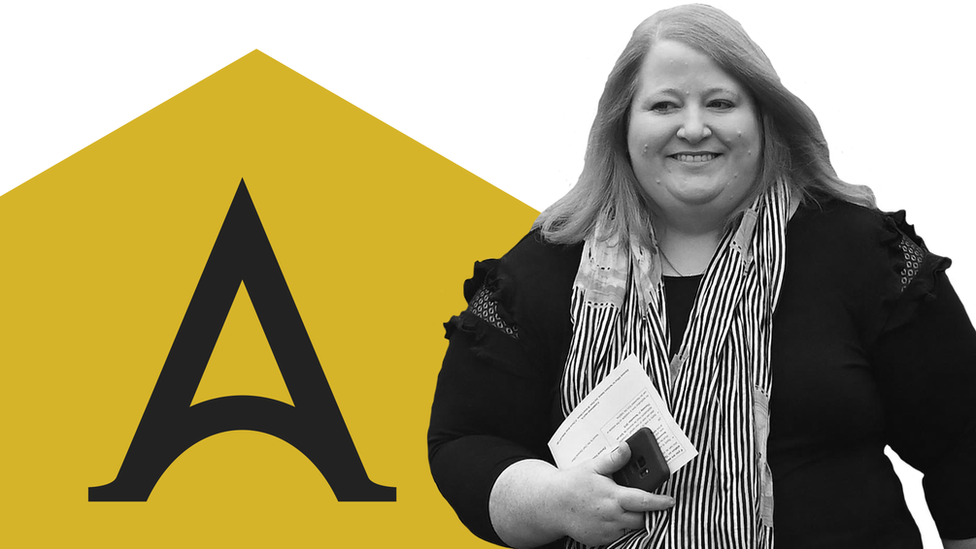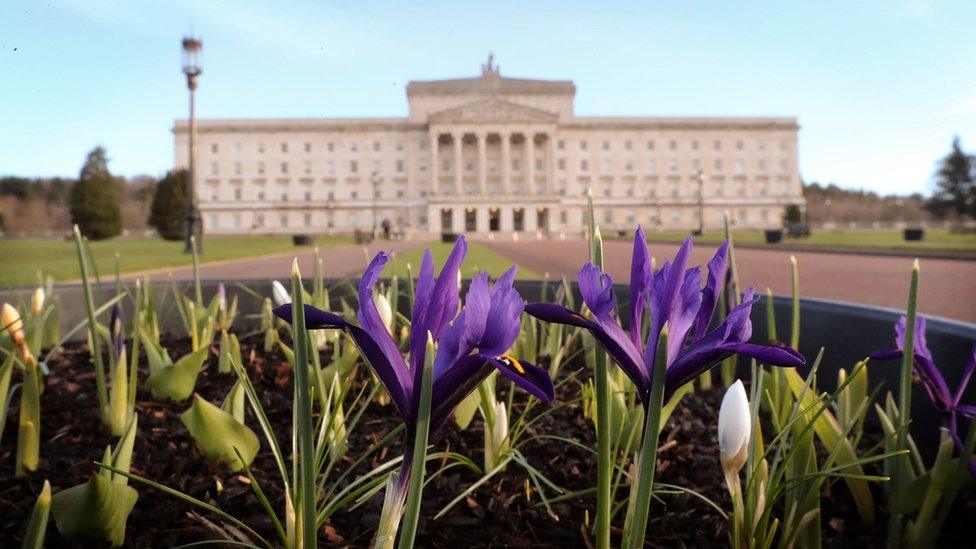NI election 2022: Alliance a party with high expectations
- Published

Naomi Long has been the leader of the Alliance Party for five years
2010: a year remembered for the Icelandic volcano that caused travel chaos, but also for an electoral eruption caused by Alliance's Naomi Long.
Then the party's deputy leader, she secured a seismic victory in the general election, unseating the Democratic Unionist Party (DUP) incumbent Peter Robinson in his Belfast East constituency.
She wasn't the first ever Alliance MP - that title belongs to Stratton Mills who defected to the party in the 1970s (but that's another story).
Nevertheless, May 2010 marked an important moment for Alliance, and the champagne certainly flowed that night.

SIGN UP FOR ALERTS: Get extra updates on BBC Northern Ireland election coverage

It would, however, take nine more years before it spilled over into greater success in three consecutive council, European and Westminster elections - later coined by political commentators as the Alliance "surge".
Naomi Long, now well established as party leader after five-plus years in charge, is hoping for a repeat performance this May.
But with expectations high and pressure to deliver, she isn't celebrating yet.
'Not taking anything for granted'
"What I am doing is preparing the party so that when we come back after the election, we are stronger and more capable of delivering," she told me this week.
"If that means on 6 May when the votes are counted we're able to pop champagne corks, that'll be a matter for 6 May - we're not taking anything for granted, we're out there knocking every door."
At the last assembly election in March 2017, Alliance got just over 9% of the vote.
By the time the Westminster election rolled around in December 2019, its vote share had jumped to 16.8% - a result hardly anyone predicted - but some later put down to voter frustration at the DUP-Sinn Féin impasse and disillusionment with Brexit negotiations.
Recent polls have suggested Alliance could be on course for a duplicate, or even better result, in just a few days' time.
The different voting procedure in Stormont elections, though, means that if Alliance wants to realise its ambition of returning more assembly members (MLAs), it needs to secure support from all sides of the electorate.
Styling itself as the centre ground of Northern Ireland politics has previously paid off, so can it work again?
Belfast Telegraph journalist Allison Morris says the party is "walking a fine balancing act".
"Sometimes we can see some Alliance members getting into unnecessary spats with people on social media or saying things that might alienate one section of the community," she says.
"To secure those extra seats they need to win over soft unionists and soft nationalists."
Alliance is running 24 candidates this time around - half of them women - across the 18 constituencies.
They returned with eight seats in 2017 but so far few in the party have been prepared to openly predict how many they will come back with this time.
Former leader and ardent number-cruncher David Ford told me at the party's annual conference in March he believes Alliance will make "at least three gains".
The party has been striving to shake off its reputation that it cannot break into constituencies west of the River Bann, with a raft of recently-elected councillors in those areas now running for the assembly.

Former Alliance leader David Ford is predicting the party could make "at least three gains"
But if Mr Ford's political forecast doesn't come to pass, will the party have to chalk this election up as a failure?
Dr Clare Rice from the University of Liverpool says "anything short of increasing vote share" will be a problem.
"They still have that issue of figuring out who is the Alliance Party beyond Naomi Long - we saw them trying to showcase new talent at their conference," Ms Rice says.
"There is also still that lingering perception that somehow a vote is weaker if you don't vote within monoliths - and that is the challenge for Alliance, persuading more people against that argument."
The first Alliance members founded the party in 1970 in response to what they called divided politics.
Since the modern assembly first began sitting in 1998, the party has designated at Stormont as "other": neither unionist nor nationalist.
Fast forward to today and the party has yet to take a stance on the question of a potential Irish unity referendum - but can it avoid doing so much longer?
The current Alliance leader believes it isn't necessary right now.
"Many voters are saying to us they like the fact it isn't our focus - you don't need a position on the border poll to deal with the cost-of-living crisis, creating jobs and many other issues," adds Mrs Long.
"Alliance like everybody else will take a position when a border poll comes, but the bottom line is we don't have a position right now because we don't know what it will entail. There's got to be a proposition first."
As for Alliance's own political propositions and the prospect of rising from the fifth largest force to third, voters will soon cast that verdict.

POSTCODE SEARCH: Is there an election in my area?
WHAT'S HAPPENING WHERE: Really simple guide
NOTIFICATIONS: Sign up for Northern Ireland election alerts

Related topics
- Published12 April 2022

- Published28 March 2022

